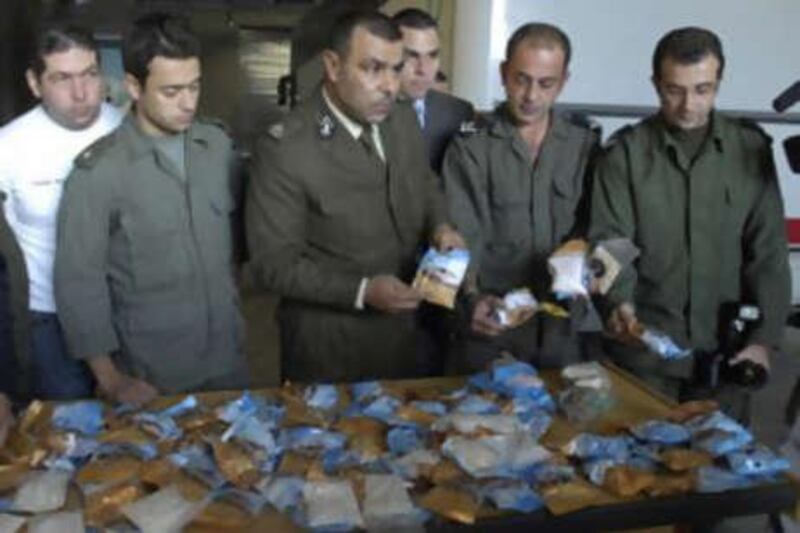The use of synthetic drugs such as amphetamines and Ecstasy has risen significantly in the Middle East, particularly the Gulf region, according to a UN report released today. In the UAE, experts said Captagon was making a "major comeback" on the local drug market and law enforcement officials said there had been a recent increase in the number of synthetic-drug seizures. Captagon - which began as a medicine used to treat depression and attention deficit hyperactivity disorder, but is now illegal - is used as an intensive stimulant. Dr Ahmed Yousif Ali, head of treatment and rehabilitation at the National Rehabilitation Centre in the capital, said almost all of his patients had abused Captagon. In GCC nations, most of the synthetic drugs seized have been Captagon. The study, published yesterday by the United Nations Office on Drugs and Crime, said that in 2006, Saudi Arabia accounted for a quarter of all amphetamine seized worldwide. The agency said the problem existed throughout the GCC. "A few years ago the Middle East represented about one per cent of all seizures of synthetic drugs; now it is closer to 25 per cent," said Walter Kemp, spokesman for the UN agency. "In 2006 Saudi Arabia seized 14 tons of the stuff; we are happy that they seized it, but that indicates that there may be a significant problem." Today, Captagon is manufactured illegally, mostly in former Soviet and Eastern European countries, as well as Turkey. "Synthetic drugs are usually amphetamine-type drugs like Ecstasy, crystal meth and Captagon," Dr Ali said. "Captagon is making a major comeback on the local market." Dr Ali said over the past six years he had seen a trend towards the drug, known locally as Abu Hilalain. The public, especially young people, should be warned about the risks of taking such stimulants, he said. "It is important to warn kids about anyone advising them to take pills to study, because it actually sabotages the brain. They don't absorb or learn anything," Dr Ali said. "It is a stimulant, so users can go for days without sleeping or eating and they are hyperactive and can have poor concentration." Despite Dr Ali's findings, Lt Col Yousef al Adeedi, deputy director of Dubai Police's anti-narcotics department, said there was no local market for synthetic drugs. But, he said, the drugs were trafficked through the UAE en route to other countries. "There are no users for those types of drugs, but some traffickers and organised criminals do try to traffic them through the UAE to Asia and Europe," he said. "We have seen an increase in all drugs in the world, but we have also seen an increase in the number of synthetic drug cases here." Lt Col Adeedi cited two separate cases in 2007, when 370kg and 170kg of amphetamines were seized, and a case this year in which 160kg of amphetamines were found by Dubai Police. Dubai Customs declined to comment on the issue.. The UN report indicated that the UAE was the only GCC state to respond to a questionnaire sent to law enforcement agencies to gauge the scale of the synthetic drug problem. Jeremy Douglas, who helped write the report, said the use of synthetic drugs was growing at an astonishing rate across the GCC. "It is in almost every country in the region; it is manufactured in Turkey, Bulgaria and Syria and transported by sea, road and air," he said. "In the UAE, we have had a number of reports of precursor chemicals [which are used to manufacture the drugs] passing through on the way to the US and Africa, but there is also a growing domestic market for the finished product as well." The biggest problem with synthetic drugs, he said, was that they were relatively easy to manufacture, given the raw materials and expertise - and factories can be set up anywhere. "If you take heroin as an example, you know that it is originating in Afghanistan and you can therefore run a campaign that is quite tightly focused on that region," Mr Douglas said. "These drugs are different. If there was a massive clampdown in Turkey, for example, the manufacturers would simply shift their operations somewhere else, either to poor and corrupt states in Africa or to India, where many of the precursor chemicals come from." Mr Douglas said there was no evidence to indicate that synthetic drug laboratories had been set up in the UAE or other GCC states. However, he said international efforts to deal with the problem were hindered by the reluctance of some states to admit that it affected them. "Countries are willing to say that drugs are moving through their territory to elsewhere, but there is sometimes a cultural resistance to admitting there is a domestic market on their own soil. "This has hit unbelievably hard and fast and it has taken a lot of countries by surprise. We have had indications that the Gulf states are willing to work with the UN to tackle the problem, but there needs to be more openness about it." Synthetic drugs have a worldwide market value of more than Dh238bn (US$65bn), according to the UN agency, but production is moving away from small-scale manufacturers to transnational organised crime groups. The recent spread of synthetic drugs is linked to a lack of resources in some parts of the world to confront the problem, with some developing countries more vulnerable to being targeted by criminal groups, according to the report. The UN agency this week began a programme to monitor worldwide synthetic-drug trends, which will work with governments to gather and share information on drug use and trafficking routes. zconstantine@thenational.ae gmcclenaghan@thenational.ae
Gulf region sees rise in drug use
The use of synthetic drugs such as amphetamines and Ecstasy has risen significantly in the Middle East.

Editor's picks
More from the national




